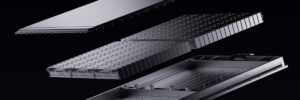
Chinese battery manufacturer CATL plans to send 2,000 of its skilled workers to Zaragoza, Spain to commission a new battery plant built by a joint venture that includes CATL and automaker Stellantis, the Financial Times reports (via The Battery Chronicle). Production is to begin in late 2026.
The project highlights the fact that the global EV industry remains dependent on superior Chinese technology. It’s only logical for CATL to bring in specialist engineers who are familiar with the technology and can get the production line up and running quickly, just as the company would do if it commissioned a new plant in China.
“Europe needs capacity, China brings speed, and everyone benefits,” as The Battery Chronicle’s Christopher Chico writes.
Everyone, that is, except the fossil fuel industry and other defenders of the status quo ante, and their representatives in governments. The irony of the situation is as heavy as a dual-chemistry lithium-ion battery pack.
“O the irony!” Part 1: A decade or two ago, Western automakers were building factories in China, and some fretted that the Chinese would “steal” Western technology. The automakers used local suppliers and local labor, and of course this “technology transfer” (to use a more tactful term) is exactly what happened. Since then, the pupils, with strong support from their government, have surpassed their teachers, who have had lukewarm support (from European governments) or outright hostility (from the current US administration).
Now some Spanish stakeholders fear that the Chinese don’t want to transfer their technology. CATL says it will recruit and train some 3,000 local workers to run the plant once it is built, as it did at its factory in Arnstadt, Germany, which opened in 2023. However, some fear that CATL is using its own workers to ramp up production in order to avoid revealing its process secrets. José Juan Arceiz of Stellantis told the FT that he “doesn’t think the Chinese want to share the know‑how” required to set up a battery factory.
Are the Chinese acting unfairly by doing the same sort of thing that Western automakers tried to do back when they were operating in China? (And how about those “unfair” government subsidies?) Instead of whispering about “industrial espionage,” Western automakers should insist that they get access to the tech they need, and governments should offer the support they need to take advantage of it. As Mr. Chico writes, “The real advantage of this partnership structure should be knowledge and technology transfer. Stellantis should make sure those benefits are written into the deal.”
“O the irony!” Part 2: Whereas European policymakers are courting foreign investment to help their auto industry catch up, the US government is actively discouraging it. When Hyundai, a company from South Korea, which (unlike China) is considered a close US ally, sent workers to commission its battery plant in Georgia, the US government arrested them, shackled them like felons on a chain gang, and only released them and sent them home after the Korean government intervened at the highest diplomatic levels.
The Chinese and the Europeans are increasingly going to be working together. BYD is building car plants in Hungary and Turkey, and hopes to support these with local battery production.
For better or for worse, European automakers need to learn from the Asians. After Northvolt, the Great European Hope that was supposed to free the Continent from dependence on Chinese tech, went belly-up (and several other European EV battery projects were postponed or abandoned), a dozen industry insiders told Reuters that the future of Europe’s battery industry may lie in joint ventures with Chinese companies.
Wir schaffen das is a good motto. But there’s another maxim that most of us learned in kindergarten: If you can’t beat ‘em, join ‘em!
Source: Financial Times via The Battery Chronicle
from Charged EVs https://ift.tt/BkrG2vh


No comments:
Post a Comment